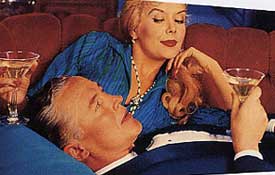BSG is back on, and so far in top form, picking up exactly where it left off over a year ago... (About frakkin' time! What is this, HBO?)
Good, good,
good: A gorgeous opening battle scene with some very sneaky Cylon maneuvers and brilliant visual flourishes. A raider explodes in a splatter of blood; the ferris-wheel ship catches fire but
doesn't explode...
The show has a lot to explain in its final season, but they have 19 episodes to go, and one thing I'll say about
BSG: they can cover a lot of ground very fast. These guys do not hold back and milk every mystery to death (ahem,
Lost, I'm looking at you...) — I expect great things, big surprises.
A couple of welcome touches: We knew when Starbuck returned that she'd be greeted with suspicion and skepticism, but I was glad to see that they didn't just summarily chuck her in the brig like every other Cylon suspect (or perennial screwups like Apollo, Helo, and the Chief). Their suspicions were tempered by their genuine affection for Kara — they want so badly to believe her story, even though it's thoroughly unbelievable. And Kara, who seemed uncharacteristically serene when she reappeared at the end of last season, is back to her usual Starbuckian roguishness, and
that's what's going to land her in the brig more than anything else.
And then there's Baltar: His storyline has been marinating in desperation, hallucination, torture, misery, and paranoia for so damn long, it's nice to see a little humor and wry irony injected into the character. They've morphed him from George W. Baltar into Julius and Ethel Baltar into Jesus H. Baltar all in the span of a single season. And now that he has his own personal harem of disciples, he is turning into one
sleazy Jesus. A big tip of the hat to James Callis, who might very well steal the season, the way things are going.
All of this brings to mind what is the great and central irony of
BSG: in 1978, the original
Battlestar series was widely panned and dismissed as a cheap knockoff of
Star Wars — which in many ways it was, if not in story, then at least in the particulars of its production.
Star Wars used SFX carefully and deliberately, and to great effect, while
Battlestar was infamous for its endlessly recycled and respliced SFX.
Star Wars gave us a plot that widened and deepened with each new film;
Battlestar shamelessly swiped its stories from the likes of
Shane,
Guns of Navarone, and
Towering Inferno.
Today, it's
Battlestar that's fresh, innovative, and compelling — the best thing to hit science fiction since
Firefly — and
Star Wars is now the disappointingly uninspired knockoff, with its stilted dialog and overreliance on SFX.
Battlestar gives us a great story, a rich array of characters, and compelling drama;
Star Wars (and you know I'm talking about the prequels here) is basically an 8-hour cartoon with really good music.
Case in point: If Lucas were helming
Battlestar, that ferris-wheel ship
totally would have exploded...

 Dr. Baltar's Cylon Detector
Dr. Baltar's Cylon Detector







